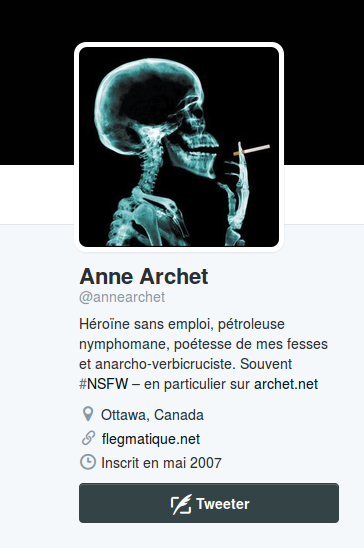Project leader: Marcello Vitali-Rosati
Project coordinator: Servanne Monjour
Team: Enrico Agostini Marchese, Marie Christine Corbeil, Julie Tremblay Dévirieux, Jean-François Thériault.
Project documentation
- The seminar Écritures numériques et éditorialisation, cycle 2015-2016.
External ressources
- Répertoire des écrivaines et des écrivains numériques
- The symposium "Écrivains, personnages, profils: l'éditorialisation de l'auteur", held on 24th and 25th May 2016 at the University of Montréal, in association with Bertrand Gervais (UQAM, CRC en Arts et littératures numériques)

Project description
The development of the participatory web, or Web 2.0, has, in recent years, led to a proliferation of so-called user profiles. Each platform requires the creation of a “profile”: from social networks to online shopping platforms, dating sites, online games, forums, newspapers, etc. On one particularly well-known social network, Facebook, users are required to report to their “friends” by publishing their personal data (date of birth, place of residence, activities, employment, family situation, etc.). On this platform, the Quebeçoise writer Anne Archet nevertheless fills her profile data fields in a disconcerting way: “employment: succubus assistant to Satan”; “Studied: Go girls, three Big Macs girls at Hamburger University,” etc. Similarly, on their Twitter profile, the fictitious writer and Oulipian personality Pharaon Parka describe themselves as “Lurker and puppet, firstly. Leaks remixer.” In 2012 Victoria Welby posted an astonishing service offer on Kijiji, the Canadian classifieds site: she defined herself as a “public writer” and proposed to write erotic emails and other licentious stories for $50 an hour. In these three cases, as in others, individuals clearly aim to subvert the purpose of digital tools. These practices exceed the framework of the conventional user profile and represent only a few examples. They highlight a wider phenomenon of writers who provocatively and playfully appropriate tools and digital forms that occupy functional spaces, in order to transform them into artistic ones. But what are the forms, values and implications of such ownership? The central hypothesis of this project is that these subversions of user profile functions and forms can be considered as literary practices that, by means of playful creativity, subvert the current use of the profile and its social implications to play a political role.
Starting from a French corpus, our project intends to verify this hypothesis with the triple objective of:
- Demonstrating the poetic function of the profile in online writing practices. Because literary studies have a major role to play as part of an interdisciplinary reflection on the digital, we aim to explore the literariness of certain online writing practices.
- Incorporating this profile study into a comparative perspective that includes historical forms of artistic practices, including visual (such as the self-portrait and the silhouette), and especially textual (autobiographical and autofictionnal) models. This is achieved by studying digital culture according to relationships of continuity rather than rupture.
- Showing the political function of literature. Literature takes into account the debate on the issue of personal data and the separation of public and private spaces of the web. If literary subversion makes use of an obviously playful function, then this re-appropriation of a formatted device, one especially designed to track users, certainly has considerable political implications.